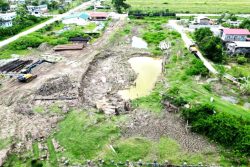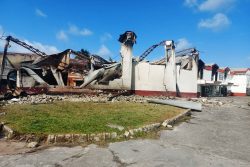This article is the third installment in a series that aims to compare the constitutional developments of British Guiana with those of Jamaica between 1890 and 1945. For this purpose, the period under comparison will be divided into three phases: 1890-1900, 1901-1930 and 1931-1945. The first two articles briefly summarized the developments of the two territories up to 1900. This article will compare and contrast constitutional developments in British Guiana and Jamaica between 1901 and 1945.
By Estherine Adams
Constitutional Developments Between 1901 and 1930.
During this second period in Jamaica only minor changes were made to the 1895 constitution. Nevertheless, as minor as these changes were they were still far more advanced than British Guiana’s. Until 1900, the Legislative Council was composed predominantly of whites from the landed and mercantile interest, with a sprinkling of professional men. In 1901 the first black man, the school-master Alex Dixon, was elected to the Council, to be followed in 1906 by Dr. Robert Love. Also, by Law 52 of 1908 the franchise was even further reduced from £10 to “ten shillings in rates on property, or of thirty shillings on personal property, or the receipt of an annual salary or wage amounting to not less than £50, will qualify for the vote.”
The other major constitutional development during this period in Jamaica was the gradual extension of the franchise to women. By Law 22 of 1919, women were admitted to the suffrage for the first time, though on terms higher than in the case of men. In order for women to qualify for the franchise they had to be twenty-five years or over and had be earning in excess of £50 or pay taxes of £2 annually. The admission of women to the suffrage placed the Jamaican constitution way ahead of British Guiana, since it was not until 1928 that women were given the vote.
Among the otherwise minor changes made to the constitution in British Guiana, such as, the reduction of the property qualification of elected members of the Court of Policy from $7500 to $5000 and the income qualification for the vote from $480 to $300 a year, in 1909, there was a radical constitutional reform in 1928. Partly as a result of the changes introduced in 1891, the monopoly of the planters was broken, and by 1926, there was only one sugar planter among the members of the Combined Court. Their successors were members of a professional and commercial group belonging to the middle class of Negroes, Coloureds, Portuguese and, to a lesser extent, Chinese and East Indians. The increasing number of local politicians in the Combined Court caused Edward Davson who was connected to the sugar interest to express alarm at the fact that power was passing into the hands of the black or coloured community. He stated that he did not believe that in colonial territories “the white element should be subject to the coloured, whether it was black, brown or yellow…”
In 1921, Major Wood, the Under-Secretary of State for the Colonies, was sent to investigate the effects of the prolonged recession in the economy and the possibility of conceding constitutional advance. He came to British Guiana in 1922. Wood concluded that there was no immediate need to overturn the ‘foundation of the constitution’. His view was that so long as the colony was able to balance its budget without the assistance of United Kingdom loans, there was no justification for making any material constitutional change.
However, the planters and the elected members were in constant conflict with the Government over finances. The annual budget was in continual deficit and the accumulated debt of the colony was increasing. This inability of the colony to balance its budget was blamed on the constitution. The deteriorating financial position was used as an excuse for sending the Wilson-Snell Commission in 1926 to examine and make recommendations on the British Guiana constitution. In their report submitted in April 1927, the commission found that the colony’s position was brought about because “the Governor was not in a position to govern” and recommended a Government majority as a means of correcting this. Based on the findings of the Wilson-Snell Commission and further difficulties in the Legislature, the British Guiana Constitution Commission was appointed to review the constitution. Based on the recommendations of this Commission, the 1891 Constitution was abolished and sweeping changes were enacted in 1928.
As a result of constitutional changes implemented by an Act of Parliament on 28 March 1928, the colony lost its peculiar political institutions. The Combined Court and the Court of Policy were abolished and replaced by a single Legislative Council of 14 elected, ten official and five nominated unofficial members, the latter type of member being introduced for the first time in the country’s legislature. The elected majority was therefore lost in the legislature. For the first time the franchise was extended to women on the same terms as were applicable to men. The Act also contained the usual safeguards; the Governor alone could initiate money votes and he had the reserve power to legislate contrary to the majority of the Legislative Council. These reforms placed British Guiana under the Crown Colony system of Government.
So while by 1930 Jamaica had a Semi-Representative Government and a constitution that reflected the elective principle, i.e., some members of the legislature are elected by the people, in striking contrast, British Guiana had Crown Colony Government, with a constitution that saw all the members of the Legislature being nominated. So while Jamaica progressed constitutionally, British Guiana retrogressed.
Constitutional Developments Between 1931 and 1945
During this period major constitutional developments took place in both British Guiana and Jamaica. Ever since 1928, the constitution of British Guiana had remained unchanged. The British Guiana constitution was amended in March 1943, by the British Guiana (Constitutional) (Amendment) Order in Council and as a result of several developments. The decade following the introduction of Crown Colony government in British Guiana was indeed a troubled one: it was marked by the worldwide economic depression which began in 1929, and which resulted in deteriorating economic conditions, strikes and violent eruptions, not only in British Guiana but in the rest of the British West Indies.
The theory that the discretionary powers of the crown officials were to be used on behalf of the unrepresented classes, which was put forward as part of the justification for the constitutional changes of 1928, was belied by the depressing political and economic conditions of the masses. Also the increasing hardship forced many liberals to see the franchise as a means of ousting the conservative element, acquiring greater control over the means of legislation and of effecting amelioration of the distressed conditions of the masses.
It was against this general background that the West India Royal Commission (Moyne Commission) was sent out in 1938, “to investigate the economic conditions in…British Guiana …Jamaica…and matters connected therewith, and to make recommendations.” The Commission’s chief recommendation was the gradual extension of the influence of the elected section in the business of government. This meant the reduction of the other elements in the agencies of Government.
In May 1941 the Governor appointed a local Franchise Commission in accordance with the recommendations of the Moyne Commission, to consider the possibility of extending the franchise. The Commission submitted its report in February 1944, in which it recommended a reduction in the qualification both for voters and for candidates for election to the legislature. A voter was required to pass a literacy test in any language and to own, or occupy or to be the tenant of three acres of land or to own land of the value of $150 or to occupy or be the tenant of property of a rental of $7 or to possess an income of $120 annually. Members of the Legislative Council had to have an income of $1,200 per annum, own property worth $1,000 or lease property worth $300 per annum. They had to be literate in English. Other monumental changes included, the disqualification on Ministers of Religion who possessed the other qualifications was removed and women were made eligible on equal terms with men for the franchise.
However, even before the report of the Franchise commission was submitted, as a result of public protest and Governor Lethem’s prodding, on 11 March 1943, the Queen in Council ultimately made the British Guiana (Constitution) (Amendment) Order in Council, 1943. This reduced the membership of the Legislative Council from thirty to twenty-five members, now consisting of the Governor as President, three official members and twenty-one unofficial members (seven nominated and fourteen elected). Thus for the first time since 1928 the elected members were to be a majority in the House. The Executive Council included the Governor, the three top officials, and five members of the Legislative Council appointed by the Governor. The pre-ministerial advisory committee system (the Legislative Council Advisory Committee) was also instituted in 1943, where several members of the Legislative Council formed a committee to sit with the official heading a department and become familiar with its administration. With the implementation of the 1943 changes, British Guiana was for the first time ahead of Jamaica in constitutional developments, in that an elected majority on the Legislative Council was first realized in British Guiana.
This advantage did not last for long, as in 1944 there was constitutional development equal to and far advanced of what British Guiana was granted in 1943. As in British Guiana, in the 1930’s conditions in Jamaica grew from bad to critical. After 1935, unemployment grew as outlets for emigration to Panama and Cuba were closed. In May 1938 a work stoppage producing incidents of violence occurred at Frome Estate of the West Indies Sugar Company. This galvanized the urban unemployed into marches demanding work, increased pay and improved working conditions. Between 23rd and 31st May 1938, the social order was shaken by a full scale rising of the black masses. The need for a more democratic constitutional order through which all sections would benefit now seemed self-evident.
J.A.G. Smith, and Harold Allen, elected members of the Legislative Council were the spokesmen for the Council members. They wished to replace Crown Colony Government with Representative Government as it existed prior to 1865 where there were two legislative chambers – the Upper House or Legislative Council, and the elected House of Assembly. The elected Assembly had control over finance and this, Smith wished to restore. But alongside the Smith proposals there were views of persons and groups outside of Parliament which aimed at establishing a new Constitution based on adult suffrage and which gave elected Ministers effective power. Among such leaders was Marcus Garvey who stated that Jamaicans should “be represented in the Imperial Parliament” and called for “a larger modicum of self-government in Jamaica.” However, the man who emerged as the leader of the masses in Jamaica was Alexander Bustamante. In an article published in The Gleaner, immediately after the Frome disturbances, he stated he wanted “to prevent workers of all classes from being trampled upon … like foot mats belonging to no one, not even the British Government.” Another leader that emerged was Norman Manley, who in 1938 launched the People’s National Party, a “party for all the people”.
As in British Guiana, the worsening conditions and disturbances in the island led to a visit by the Moyne Commission in 1938. The commission recognized the demand for more self-government and held that the “existing circumstance” limited the degree of political autonomy that could be granted. The Commission recommended a more representative Legislative Council, counterbalanced by somewhat increased powers for the governor. The Moyne recommendations for limited political reform seemed to win favour at first, but were rejected by the Legislative Council. In October, 1942, a proposal for a new constitution was put forward in a joint memorandum and by 1943, the Secretary of State for the Colonies, stated that Britain was now ready to introduce “far reaching constitutional advances” in Jamaica. This constitution came into effect on 20 November 1944.
The Constitution restored the two-chamber legislature, with an all elected Lower House or House of Representatives of thirty-two members and an all nominated Upper House or Legislative Council of fifteen. The ‘principal instrument of policy’, however, was the Executive Council, comprised of five members of the House of Representatives and five from the Legislative Council, presided over by the Governor as Chairman. The usual safety provisions were made: the Governor had the right to legislate contrary to the wishes of the legislature, with the consent of the Secretary of State. It must be noted, however, that a majority of the members were now elected by and responsible to the House of Representatives.
This change brought Jamaica on par with British Guiana, in that both colonies now had majority elected members on the Legislative Council. However, the developments surpassed that of Guiana with the granting of universal adult suffrage (everyone over twenty-one years old had the right to vote) in Jamaica under the 1944 Constitution. The constitution of 1944, considered in connection with the adoption of universal adult suffrage was a recognition that the mass of black and coloured inhabitants of Jamaica should have a power in government more nearly proportional to their numbers. This was not achieved in British Guiana until 1953.
It can be concluded that constitutional developments, though generally similar in the two colonies, had marked differences. Throughout the period under discussion, these differences were manifested in the timing of these developments, with developments in Jamaica always ahead those of British Guiana. During the first period discussed, 1890-1900, marked developments took place in both territories. The 1891 changes in British Guiana provided, for the first time, a real opportunity for members of the legislature to be elected by the enfranchised, and gave them a chance to share in the government. Although there were no immediate and spectacular changes, the reforms of 1891 marked a definite turning-point in the Guianese constitutional history. This development was, however, achieved in Jamaica in 1884 and by 1895 the Jamaican constitution reflected an increase in the number of elected members in the Legislative Council. Under both constitutions the franchise was reduced, but this reduction was not initially reflected at the polls.
During the second period, 1901-1930, there were developments in Jamaica and setbacks in British Guiana. In Jamaica there were mainly minor improvements to the 1895 amendment, but of importance was the extension of the franchise to women for the first time in 1919, even though it was on a higher qualification than men. Women did not acquire the franchise in British Guiana until 1928. What was significant during this period in British Guiana was the first suspension of the constitution, which led to the retrogression of constitutional development in the colony. With the suspension of the 1891 Constitution, British Guiana was placed under full Crown Colony Government, a situation under which Jamaica willingly placed itself in 1866. Crown Colony Government saw the introduction of a fully nominated legislature in Guiana, while at this time Jamaica still had semi- Representative Government and the people were electing members to the legislature.
In the third period, considerable developments were witnessed in both territories. In British Guiana, as a result of local situations due to the international depression the Moyne Commission was sent out to investigate the conditions and make recommendations. The Commission recognized the need for the involvement of the locals in the government. These recommendations, along with local agitation led to the 1943 Constitutional changes which witnessed an end of Crown Colony Government and a reintroduction of the elective principle, which saw a majority in the elected members in the Legislative Council. British Guiana was, for the first time during the period under discussion, ahead of Jamaica in developments.
This was not for long, as the 1938 disturbances on the island, also due to the international depression, led to recommendations for more involvement in government by the Moyne Commission. However, it was the agitation of groups both within and outside of the legislature that led to the 1954 Constitutional Development which saw the restoration of the two-chambers legislature with an elected majority in the lower house, and more importantly, the introduction of universal adult suffrage, which Guiana did not achieve until 1953. Thus, in terms of constitutional developments, those of Jamaica were always more advanced than that of British Guiana.









